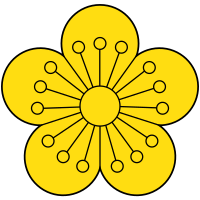Gojong of Korea
Gojong (Korean: 고종; Hanja: 高宗; RR: Gojong; MR: Kojong), the Emperor Gwangmu (Korean: 광무제; Hanja: 光武帝; RR: Gwangmuje; MR: Kwangmuje; 8 September 1852 – 21 January 1919), was the last king of Joseon and the first Emperor of Korea.
| Gojong 고종 | |||||||||||||
|---|---|---|---|---|---|---|---|---|---|---|---|---|---|
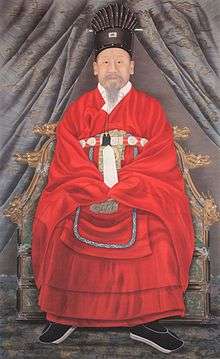 | |||||||||||||
| Emperor of Korea | |||||||||||||
| Reign | 13 October 1897 – 19 July 1907 | ||||||||||||
| Successor | Sunjong | ||||||||||||
| King of Joseon | |||||||||||||
| Reign | 13 December 1863 – 13 October 1897 | ||||||||||||
| Predecessor | Cheoljong | ||||||||||||
| Regents | See list
| ||||||||||||
| Born | 8 September 1852 Unhyeon Palace, Hanseong, Joseon dynasty, Korea | ||||||||||||
| Died | 21 January 1919 (aged 66) Deoksu Palace, Keijō, Japanese Korea | ||||||||||||
| Burial | |||||||||||||
| Spouse | Queen Myeongseong | ||||||||||||
| Issue | Emperor Sunjong Prince Imperial Ui Crown Prince Euimin Princess Deokhye | ||||||||||||
| |||||||||||||
| House | House of Yi | ||||||||||||
| Father | Heungseon Daewongun | ||||||||||||
| Mother | Grand Lady Sunmok | ||||||||||||
| Korean name | |
| Hangul | |
|---|---|
| Hanja | |
| Revised Romanization | Gojong Gwangmuje (short Gojong) |
| McCune–Reischauer | Kojong Kwangmuje (short Kojong) |
| Birth name | |
| Hangul | 이명복, later 이희 |
| Hanja | 李命福, later 李㷩[1] |
| Revised Romanization | I Myeong-bok, later I Hui |
| McCune–Reischauer | Yi Myŏng-bok, later Yi Hŭi |
Biography
Early reign
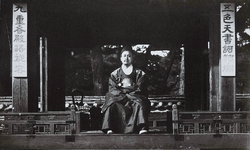
Gojong took the Joseon throne in 1863 when still a child. As a minor, his father, the Heungseon Daewongun (or more commonly, the Daewongun), ruled as regent for him until Gojong reached adulthood.
During the mid-1860s, the Heungseon Daewongun was the main proponent of isolationism and the instrument of the persecution of native and foreign Catholics, a policy that led directly to the French invasion and the United States expedition to Korea in 1871. The early years of the Daewongun's rule also witnessed a concerted effort to restore the largely dilapidated Gyeongbok Palace, the seat of royal authority. During the Daewongun's reign, Joseon factional politics, the Seowon (learned academies that often doubled as epicenters of factional power), and the power wielded by the Andong Kim clan, completely disappeared as political forces within Korean state life.
In 1873, Gojong announced his assumption of direct royal rule. In November 1874, with the retirement of the Heungseon Daewongun, Gojong's consort, Queen Min (posthumously known as Empress Myeongseong), gained complete control over the court, filling senior court positions with members of her family. This angered Heungseon Daewongun, who was exiled from the court. Some relatives of Heungseon Daewongun and members of the Southerner faction plotted a coup.
External pressures and unequal treaties
In the 19th century, tensions mounted between Qing China and Japan, culminating in the First Sino-Japanese War in 1894–1895. Much of this war was fought on the Korean peninsula. Japan, after the Meiji Restoration, had acquired Western military technology and had forced Joseon to sign the Treaty of Ganghwa in 1876. Japan encroached upon Korean territory in search of fish, iron ore, and other natural resources. It also established a strong economic presence in the peninsula, heralding the beginning of Japanese Imperial expansion in East Asia.
The French campaign against Korea of 1866, United States expedition to Korea in 1871, and the Incident of the Japanese gunboat Unyo put pressure on many of Joseon's officials, including King Gojong.
The Treaty of Ganghwa became the first unequal treaty signed between Korea and a foreign country; it gave extraterritorial rights to Japanese citizens in Korea and forced the Korean government to open three ports, Busan, Incheon, and Wonsan, to Japanese and foreign trade. With the signing of its first unequal treaty, Korea became easy prey for many imperialistic powers, and later the treaty led to Korea being annexed by Japan.[2]
Imo Rebellion and Gapsin Coup
King Gojong began to rely on a new paid army of rifle-equipped soldiers. The old army, which was primarily armed with swords, spears, and old matchlocks, eventually revolted as a result of their mediocre wages and loss of prestige, and the Heungseon Daewongun was restored to power. However Chinese troops, led by the Qing Chinese general Yuan Shikai, soon abducted the Daewongun and took him to China, thus foiling his return to power. Four years later the Daewongun returned to Korea.
On 4 December 1884, five revolutionaries initiated the Gapsin Coup, an attempted coup d'état, by leading a small anti-old minister army, attempting to detain King Gojong and Queen Min. The coup failed after 3 days. Some of its leaders, including Kim Okgyun, fled to Japan, and others were executed.
Peasant revolts
Widespread poverty presented significant challenges to the 19th century Joseon Dynasty. One indication of this poverty was the poor conditions of life suffered by those of the lower classes, who often had little to eat and lived in little more than run down shanties lined along roads of dirt and mud.[3] A number of factors, including famine, poverty, high taxes and corruption among the ruling class, led to several notable peasant revolts in the 19th century. King Gojong's predecessors had suppressed an 1811–1812 revolt in the Pyeongan Province, led by Hong Gyeong-nae.[4]
In 1894, another major revolt, the Donghak Peasant Revolution took hold as an anti-government, anti-yangban and anti-foreign campaign. To suppress the rebellion, the Joseon government requested military aid from Japan, thus deepening Japanese claims to Korea as a protectorate.[5] In the end the revolution failed, but many of the peasants' grievances were later dealt with by the Gabo Reform.
Assassination of Queen Min
In 1895, Empress Myeongseong, also known as Queen Min, was assassinated by Japanese agents. The Japanese minister to Korea, Miura Gorō orchestrated the plot against her. A group of Japanese agents entered the Gyeongbokgung in Seoul, which was under guard by Korean troops sympathetic to the Japanese, and the Queen was killed in the palace. The Queen had attempted to counter Japanese interference in Korea and was considering turning to Russia or China for support.
Anti-Japanese sentiments in Korea
By 1895 Japan had won the First Sino-Japanese War, gaining much more influence over the Korean government. The Gabo reforms and the assassination of the Queen also stirred controversy in Korea, fomenting Korean anti-Japanese sentiments.
Some Confucian scholars, as well as farmers, formed over 60 successive righteous armies to fight for Korean freedom. These armies were preceded by the Donghak movement and succeeded by various Korean independence movements.
Korea royal refuge at the Russian legation
On 11 February 1896, King Gojong and his crown prince fled from the Gyeongbokgung to the Russian legation in Seoul, from which they governed for about one year, an event known as Korea royal refuge at the Russian legation.
Proclamation of empire
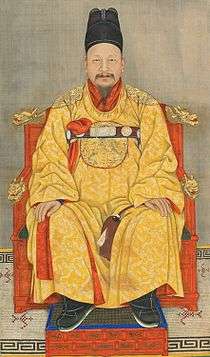
In 1897, King Gojong, yielding to rising pressure from overseas and the demands of the Independence Association-led public opinion, returned to Gyeongungung (modern-day Deoksugung). There he proclaimed the founding of the Empire of Korea, officially redesignated the national title as such, and declared a new era name Gwangmu (Hangul: 광무, Hanja: 光武) (meaning, "shining and martial"). This effectively ended Korea's historic subordination to the Qing empire which Korea had acknowledged since the fall of the Ming Dynasty, King Gojong took the title of Gwangmu Emperor, and became the first imperial head of state and hereditary sovereign of the Empire of Korea.
This marked the end of the traditional Chinese tributary system in the Far East. Adopting the status of Empire meant that Korea was declaring itself the co-equal of Qing China, that it was independent of it and, at least nominally, it implemented the "full and complete" independence of Korea as recognized in 1895.
Emperor of Korea
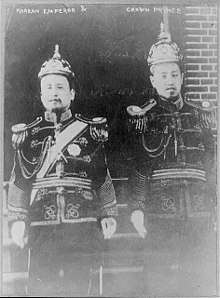
Gojong proclaimed the Korean Empire in October 1897 to justify the country's ending of its traditional alliance to China. He tried to promote the ultimately modernizing late Gwangmu Reform.
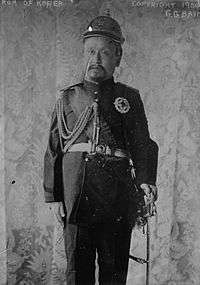
In 1904-5, the Japanese military achieved a comprehensive victory in the Russo-Japanese War. Following the Protectorate Treaty of 1905 between Korea and Japan, which stripped Korea of its rights as an independent nation, Gojong sent representatives to the Hague Peace Convention of 1907 in order to try to re-assert his sovereignty over Korea. Although the Korean representatives were blocked by the Japanese delegates, they did not give up, and later held interviews with newspapers.
One representative warned forebodingly of Japanese ambitions in Asia: "The United States does not realize what Japan's policy in the Far East is and what it portends for the American people. The Japanese adopted a policy that in the end will give her complete control over commerce and industry in the Far East. Japan is bitter against the United States and against Great Britain. If the United States does not watch Japan closely she will force the Americans and the English out of the Far East."
As a result, Gojong was forced to abdicate by the Japanese and Gojong's son Sunjong succeeded to the throne. And after Sunjong, the kingdom of Joseon ended.
After abdication

After abdicating, Emperor Gojong was confined to the Deoksu Palace. On 22 August 1910, the Empire of Korea was annexed by Japan under the Japan-Korea Annexation Treaty. In the treaty, Gojong lost his title as a former emperor; instead, he received a new title, "King Emeritus Yi of Deoksu" (徳寿宮李太王), and was recognized as a member of the imperial family of Japan.
Gojong died suddenly on 21 January 1919 at Deoksugung Palace at the age of 66. There is much speculation that he was killed by poison administered by Japanese officials, an idea that gained wide circulation and acceptance at the time of his death. His death and subsequent funeral proved a catalyst for the March First Movement for Korean independence from Japanese rule. He is buried with his wife at the imperial tomb of Hongneung (홍릉, 洪陵) in the city of Namyangju.
Family
| Joseon dynasty monarchs | ||||||||||||||||||||||||||||||||||||||||||||||||||||||
|---|---|---|---|---|---|---|---|---|---|---|---|---|---|---|---|---|---|---|---|---|---|---|---|---|---|---|---|---|---|---|---|---|---|---|---|---|---|---|---|---|---|---|---|---|---|---|---|---|---|---|---|---|---|---|
|
||||||||||||||||||||||||||||||||||||||||||||||||||||||
- Father: Yi Ha-Eung, Grand Internal Prince Heungseon (21 December 1820 – 22 February 1898) (이하응 흥선대원군)
- Paternal Grandfather: Yi Gu, Prince Namyeon (22 August 1788 – 19 March 1836) (이구 남연군)
- Paternal Grandmother: Princess Consort Min of the Yeoheung Min clan (26 June 1788 – 1831) (군부인 여흥민씨)
- Mother: Grand Internal Princess Consort Sunmok of the Yeoheung Min clan (3 February 1818 – 8 January 1898) (순목대원비 민씨)
- Maternal Grandfather: Min Chi-Gu (1795 – 14 December 1874) (민치구)
- Maternal Grandmother: Lady Yi of the Jeonju Yi clan (? – 17 November 1873) (전주 이씨)
- Consorts and their Respective Issue(s):
- Empress Myeongseong of the Yeoheung Min clan (19 October 1851 – 8 October 1895) (명성황후 민씨)[6]
- Imperial Noble Consort Sunheon of the Yeongwol Eom clan (2 February 1854 – 20 July 1911) (순헌황귀비 엄씨)[11][12]
- Yi Eun, Crown Prince Uimin (20 October 1897 – 1 May 1970) (이은 의민태자)[13][14]
- Imperial Consort Yeongbo Gwi-in of the Gyeongju Lee clan (1843 – 17 December 1928) (영보당귀인 이씨)
- Yi Seon, Prince Wanhwa (16 April 1868 – 12 January 1880) (이선 완화군)[15]
- Unnamed daughter (1871 – 1872)
- Imperial Consort Gwi-in of the Deoksu Jang clan (귀인 장씨)
- Yi Kang, Prince Uihwa (30 March 1877 – August 1955) (이강 의화군)[16][17]
- Imperial Consort Gwanghwa Gwi-in of the Lee (1887 – 1970) (광화당 귀인 이씨)[18]
- Prince Yi Yuk (1914 – 1915) (이육)[19]
- Imperial Consort Bohyeon Gwi-in of the Haeju Jeong clan (1882 – 1943) (보현당 귀인 정씨)
- Prince Yi U (20 August 1915 – 25 July 1916) (이우)
- Imperial Consort Boknyeong Gwi-in of the Cheongju Yang clan (27 September 1882 – 22 April 1929) (복녕당 귀인 양씨)
- Princess Deokhye (25 May 1912 – 21 April 1989) (덕혜옹주)[20]
- Imperial Consort Naean Gwi-in of the Lee clan (1847 – 13 February 1914) (내안당 귀인 이씨)
- Unnamed daughter (1879 – 1880)
- Lady Kim of the Samchuk Hall (1892 – 23 September 1970) (삼축당 김씨)[21][22]
- Lady Kim of the Jeonghwa Hall (정화당 상궁 김씨)[22]
- Court Lady Seo (상궁 서씨)[22]
- Court Lady Kim (상궁 김씨)[23][22]
- Court Lady Jang (궁인 장씨)[22]
Honours
- Korean honours
- Founder and Sovereign of the Grand Order of the Golden Ruler – 17 April 1900
- Founder and Sovereign of the Grand Order of the Auspicious Stars – 17 April 1900
- Founder and Sovereign of the Grand Order of the Plum Blossoms – 17 April 1900
- Founder and Sovereign of the Order of the National Crest – 17 April 1900
- Founder and Sovereign of the Order of the Purple Falcon – 16 April 1901
- Founder and Sovereign of the Order of the Eight Trigrams – 16 April 1901
- Grand Order of the Auspicious Phoenix, Grand Cordon – 1907
- Foreign honours
_crowned.svg.png)
.svg.png)
.svg.png)

.svg.png)
.svg.png)
.svg.png)


.svg.png)
Ancestry
| Ancestors of Emperor Gojong | |||||||||||||||||||||||||||||||||||||||||||||||||||||||||||||||||||||||||||||||||||||||||||||||||||||||||||||||||||||||||||||||||||||||||||||||||||||||||||||||||||||||||||||||||||||||||||||||||||||||||||||||||||||||||||||||||||||||||||||||||||||||||||||||||||||||||||||||||||||||||||||||||||||||||||||||||||||||||||||||||||||||||||||||||||||||||||||||||||||||||||||||||||||||||||||||||||||||||||||||||||||||||||||||||||||||||||||||||||||||||||||||||||||||||||||||||||
|---|---|---|---|---|---|---|---|---|---|---|---|---|---|---|---|---|---|---|---|---|---|---|---|---|---|---|---|---|---|---|---|---|---|---|---|---|---|---|---|---|---|---|---|---|---|---|---|---|---|---|---|---|---|---|---|---|---|---|---|---|---|---|---|---|---|---|---|---|---|---|---|---|---|---|---|---|---|---|---|---|---|---|---|---|---|---|---|---|---|---|---|---|---|---|---|---|---|---|---|---|---|---|---|---|---|---|---|---|---|---|---|---|---|---|---|---|---|---|---|---|---|---|---|---|---|---|---|---|---|---|---|---|---|---|---|---|---|---|---|---|---|---|---|---|---|---|---|---|---|---|---|---|---|---|---|---|---|---|---|---|---|---|---|---|---|---|---|---|---|---|---|---|---|---|---|---|---|---|---|---|---|---|---|---|---|---|---|---|---|---|---|---|---|---|---|---|---|---|---|---|---|---|---|---|---|---|---|---|---|---|---|---|---|---|---|---|---|---|---|---|---|---|---|---|---|---|---|---|---|---|---|---|---|---|---|---|---|---|---|---|---|---|---|---|---|---|---|---|---|---|---|---|---|---|---|---|---|---|---|---|---|---|---|---|---|---|---|---|---|---|---|---|---|---|---|---|---|---|---|---|---|---|---|---|---|---|---|---|---|---|---|---|---|---|---|---|---|---|---|---|---|---|---|---|---|---|---|---|---|---|---|---|---|---|---|---|---|---|---|---|---|---|---|---|---|---|---|---|---|---|---|---|---|---|---|---|---|---|---|---|---|---|---|---|---|---|---|---|---|---|---|---|---|---|---|---|---|---|---|---|---|---|---|---|---|---|---|---|---|---|---|---|---|---|---|---|---|---|---|---|---|---|---|---|---|---|---|---|---|---|---|---|---|---|---|---|---|---|---|---|---|---|---|---|---|---|---|---|---|---|---|---|---|---|---|---|---|---|---|---|---|---|---|---|---|---|---|---|---|---|---|---|---|---|---|---|---|---|---|---|---|---|---|---|---|---|---|---|---|---|---|---|---|---|---|---|---|---|---|---|---|---|---|---|---|---|---|
| |||||||||||||||||||||||||||||||||||||||||||||||||||||||||||||||||||||||||||||||||||||||||||||||||||||||||||||||||||||||||||||||||||||||||||||||||||||||||||||||||||||||||||||||||||||||||||||||||||||||||||||||||||||||||||||||||||||||||||||||||||||||||||||||||||||||||||||||||||||||||||||||||||||||||||||||||||||||||||||||||||||||||||||||||||||||||||||||||||||||||||||||||||||||||||||||||||||||||||||||||||||||||||||||||||||||||||||||||||||||||||||||||||||||||||||||||||
In popular culture
- Portrayed by Lee Jin-woo and Lee Joon in the 2001-2002 KBS2 TV series Empress Myeongseong.
- Portrayed by Kim Young-min in the 2009 film The Sword with No Name.
- Portrayed by Choi Jong-hwan in the 2010 SBS TV series Jejungwon.
- Portrayed by Park Hee-soon in the 2012 film Gabi.
- Portrayed by Lee Min-woo in the 2014 KBS2 TV series Gunman in Joseon.
- Portrayed by Park Min-sang in the 2016 film The Map Against The World.
- Portrayed by Baek Yoon-sik in the 2016 film The Last Princess.
- Portrayed by Lee Seung-joon in the 2018 tvN and Netflix TV series Mr. Sunshine.
See also
- List of Korea-related topics
- History of Korea
- Rulers of Korea
- Heungseon Daewongun
- Empress Myeongseong
- List of Head of State and Government deposed by foreign power in the 20th and 21st century
Notes
References
- 高宗太皇帝行狀 Archived 19 April 2014 at the Wayback Machine
- Lee Jae-min (8 September 2010). "Treaty as prelude to annexation". The Korea Herald. Retrieved 26 July 2012.
- Lankov, Andrei; Kim EunHaeng (2007). The Dawn of Modern Korea. 384-12 Seokyo-dong, Mapo-gu, Seoul, South Korea, 121-893: EunHaeng Namu. p. 47. ISBN 978-89-5660-214-1.CS1 maint: location (link)
- "Hong Kyŏng-nae Rebellion". Encyclopædia Britannica Online. Encyclopædia Britannica. 2010.
- Kim Hyungyoon, "Jangheung, Where Korean Literature Is Deeply Rooted"
- She is given the posthumous title of 태황후 Taehwanghu
- He only lived for 4 days.
- She only lived for 222 days (about 7 months, 1 week, 5 days).
- He only lived for 14 days (about 2 weeks)
- He only lived for 105 days (about 3 months, 2 weeks, 1 day).
- She is given the posthumous title of 순헌황귀비 (Sunheon Hwang-Gwi-bi "Sunheon, Imperial Concubine of the Highest Rank")
- Her whole name is Eom Seon-yeong (엄선영), daughter of Eom Jin-sam (엄진삼) and Jeung Chan-jeong (증찬정).
- During the Korean Empire, he is named "Prince Yeong of the Empire" (영친왕)
- Gojong's seventh son. He married Princess Masako Nashimotonomiya of Japan, a daughter of Prince Morimasa Nashimotonomiya of Japan.
- During the Korean Empire, he is posthumously named as "Prince Wan of the Empire" (완친왕).
- During the Korean Empire, he is named "Prince Ui of the Empire" (의친왕)
- He married Kim Su-deok (who became Princess Deogin), daughter of Baron Kim Sa-jun.
- Her whole name is Lee Wan-heung (이완흥) of the Gwanghwa Hall
- Others say that he lived 1906–1908
- Gojong's 4th daughter. She married Count Takeyuki Sō, a Japanese nobleman of Tsushima.
- Her whole name is Kim Ok-gi (김옥기)
- No issue.
- Her whole name is Kim Chung-yeon (김충연)
- Shaw, Wm. A. (1906) The Knights of England, I, London, p. 403
- Jørgen Pedersen (2009). Riddere af Elefantordenen, 1559–2009 (in Danish). Syddansk Universitetsforlag. p. 466. ISBN 978-87-7674-434-2.
External links
| Wikimedia Commons has media related to Gojong of the Korean Empire. |
Gojong of Korea Born: 25 July 1852 Died: 21 January 1919 | ||
| Regnal titles | ||
|---|---|---|
| Preceded by Cheoljong |
King of Joseon 13 December 1863 – 13 October 1897 with Heungseon Daewongun (1863–1873) Empress Myeongseong (1873–1895) |
Elevated to Emperor |
| Elevated to Emperor | Emperor of Korea 13 October 1897 – 19 July 1907 |
Succeeded by Yunghui Emperor |
